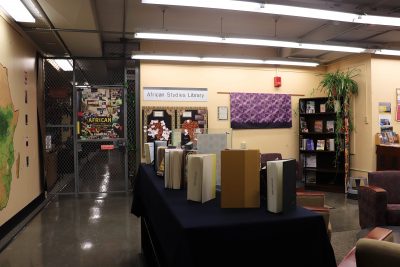Human beings sometimes read stories to step into another person’s shoes, escape their own lives or to delve into something new, exciting and different. But just how new and different is the publishing industry, and where is it headed?

A 2019 Bustle article reported an increase in diverse representation in the publishing industry, partially due to the 2014 We Need Diverse Books campaign.
However, the article also reported that the characters in children’s books that were only seven percent African American, compared to 50 percent white characters, as a 2018 Cooperative Children’s Book Center of Education study found.
The African American Studies program at Boston University hosted their annual book sale fundraiser at the African American Studies department building for six hours on Friday.
Meredith McDuffie, a senior in the College of Arts and Sciences who worked at the event, said the book sale had almost 150 books for sale, with primarily Black authors represented. This was not necessarily a deliberate choice, McDuffie said, but a reflection of the community’s donations and interests.
“I feel like [that’s] always on the back of our minds, how much exposure are authors of color getting, and not just in really popular genres like fiction or drama or anything but also academically speaking,” McDuffie said, “this is a school, this is an institution, it’s an academic program. So we do think it’s important to promote academics of color.”
While the book sale was attended primarily by those connected to the department, Lisa Gozashti, co-owner of Brookline Booksmith, said bookstore owners and residents in Brookline and Boston are leading the way to a more diverse future.
“We consider it our mission … to celebrate diverse voices and to celebrate all voices,” Gozashti said. “Especially in a time that’s as fractious as the times that we’re currently living in, it’s even more imperative that we dig deeper and are more disciplined and making sure that we are representing all of those voices.”
Black authors in particular are represented in every section of Brookline Booksmith, Gozashti said.
“Wherever their voices are in print, we do our very best to honor those voices and make them available to our public,” Gozashti said.
Not only are diverse voices represented, Gozashti said, but they have become more popular in recent years. Gozashti, who has worked for the store for 21 years, said she has “definitely” seen this popularity reflected in an increase in sales at Brookline Booksmith.
“The sales have grown hugely and interest has grown and our events have been great,” Gozashti said. “When we have Black authors or transnational authors, there’s an increasing attendance [and] the Black studies section has quadrupled in the last few years.”
Gozashti said the store prides itself in particular on their Transnational Literature Series — a new initiative by the bookstore in partnership with Words Without Borders and the Forum Network at WGBH — to promote works in translation and those that focus on migration.
The series has been well-regarded by the community, Gozasthi said, so much so that she said they moved the transnational section closer to the window.
Although there is still discrimination in the publishing industry, Gozasthi said she still has hope for a positive, diverse future throughout bookstores.
“[Other bookstores] are going to want to be representing [diverse] voices because that’s where the heart of literature is today,” Gozashti said. “That’s where all the real creative work is being done.”
Joyce Kosofsky, who owns Brattle Book Shop with her husband, said the store only sells used, rare and antiquarian books they purchase used from estates.
With books coming from what Kosofsky referred to as the “three D’s” — death, divorce and debt — the Boston bookstore offers a wide range of subjects.
“You name the section, we have it,” Kosofsky said. “We’re a general bookshop, we don’t specialize. My husband always says we specialize in not specializing. If it’s a subject, we’ve got a section for it.”
By the nature of their store, Kosofsky said they can’t seek out specific authors or specific books, and would not turn away a book from a particular ethnicity. Kosofsky said she could not quantify the racial diversity among their collections.
“We don’t represent authors as [much as we] sell books,” Kosofsky said. “That’s about as diverse as it can get.”
CORRECTION: A previous version of this article stated that Brattle Book Shop accepts books as donations. An updated version states all books sold by Brattle Book Shop are purchased.





















































































































Joyce Kosofsky • Mar 11, 2020 at 9:49 am
Thank you for correcting this.
Sincerely,
Joyce Kosofsky
Brattle Book Shop
Joyce Kosofsky • Mar 9, 2020 at 8:21 am
Thank you Lily for interviewing me. There is a serious error in your reporting, however. The Brattle Book Shop does not accept donations. We buy our books outright. To report this is injurious to our business and will discourage people with serious libraries from contacting us. Whoever fact checked, edited, or supervised this piece needs to retract that immediately.
Sincerely,
Joyce Kosofsky
Brattle Book Shop
Joyce Kosofsky • Mar 6, 2020 at 7:52 am
Dear Lily,
Thank you interviewing me. There is a serious error in your reporting which is injurious to our business. We do not acquire our books through donations. We outright buy all of our books. This needs to be retracted and restated in your piece. By saying we get our books solely through donations discourages people from offering us their books for sale which is how our business runs. I know you are a student but whoever fact checked, edited and or supervised this piece failed.
Sincerely,
Joyce Kosofsky